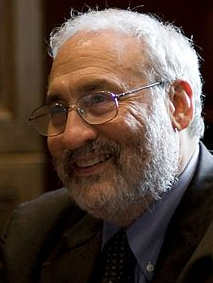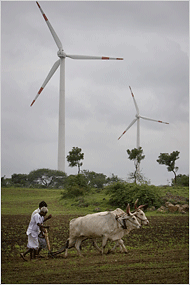Joseph E. Stiglitz, winner of the Nobel Prize in Economics, is the bestselling author of Globalization and its Discontents, Making Globalization Work, and, with Linda Bilmes, The Three Trillion Dollar War. Most recently, Stiglitz authored Freefall, a book about America, free markets, and the sinking of the world economy.
Stiglitz is a vocal critic not necessarily of globalization but in how globalization has been carried out. Stiglitz served as the Senior Vice President for the World Bank and witnessed firsthand the mismanagement of globalization strategies and their influence on the current global financial crisis.
In a recent talk, Stiglitz pointed out that there are great parallels between our current financial crisis and what happened in the Great Depression. In both cases, he said, deficit hawks called for sharp cutbacks in government spending. However, as opposed to what brought us out of the Great Depression–government investment in creating infrastructure that would support a necessary economic transformation from agriculture jobs to manufacturing jobs–the current deficit hawk calls have been heeded to the extent of 700,000 lost jobs in the public sector, mostly from education. According to Stiglitz, “Instead of pushing forward a structural transition that is inevitable—instead of investing in the right kinds of human capital, technology, and infrastructure, which will eventually pull us where we need to be—the government is holding back. Current strategies can have only one outcome: they will ensure that the Long Slump will be longer and deeper than it ever needed to be.”
 Stiglitz recommends government borrowing (at historically low interest rates, he notes) to help create infrastructure, technology, and education that will help America build industries for generations to come. He notes that since we’ve underinvested for decades, the return on investment on these investments can be assumed to be quite high.
Stiglitz recommends government borrowing (at historically low interest rates, he notes) to help create infrastructure, technology, and education that will help America build industries for generations to come. He notes that since we’ve underinvested for decades, the return on investment on these investments can be assumed to be quite high.
Without investment in basic research, what will fuel the next spurt of innovation? Long-term economic growth at our current rates of resource consumption is impossible, so funding research, skilled technicians, and initiatives for cleaner and more efficient energy production will not only help us out of the recession but also build a robust economy for decades.
Stiglitz did his research on Hawai’i before he came: “It’s really very impressive [looking at your electricity costs]”, he said, to widespread laughter. According to Stiglitz, two things happened in the last 20 years should have brought these prices down relative to the rest of the country. One thing is that economies of scale don’t actually apply for electricity costs. It used to be common wisdom that creating LARGE amounts of energy in one place would drive the cost per watt down quite a bit. Now that’s not really the case. Also, he said, the price of solar power has dropped precipitously in recent decades.
So why haven’t these two trends driven down prices? It’s a matter of our political will in Hawaii, he said. “Other countries have solved this problem. They’ve got a big proportion of their energy from small producers. It really democratizes the production of energy and changes the dynamics of our society.”
Joseph Stiglitz is a professor of Economics at Columbia University, the author of Freefall, and an economic advisor to President Obama.




